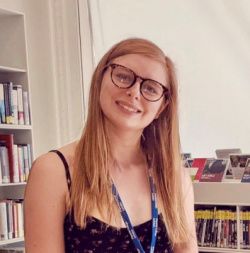Emma Pearce
 Research Assistant, Imperial College London
Research Assistant, Imperial College London
What does it mean to be a woman in STEM?
It’s difficult to articulate this because really, it’s just an aspect of my life that feels pretty unremarkable most of the time. I’m a woman and I work in STEM but I also do lots of other things. Perhaps that is what it means to be a woman in STEM, just existing as myself in a historically male-dominated space. I show up, I do great science, and some days I’ll do it in a dress and glittery nails. Femininity and hard science aren’t mutually exclusive and that applies to any gender identity.
Why is gender equality important in STEM?
There are two answers to this for me. The first is a logical argument. It makes no sense to rule out more than half of the population, within which is an enormous breadth of unique personalities, skills, and experiences. To capitalise on that variety in a workforce, the gender balance has to tend towards equality.
The second argument is on a more human level. As I was writing this, I found myself thinking “I’ve actually been really lucky to only have a few experiences of explicit gender bias in my career.” What an unbelievably sad sentence! I shouldn’t excuse those instances – things like refusing to even learn my name – just because so many people experience it more often or more severely. My hope is that, as we move towards gender equality, these experiences become less common and that being surrounded by brilliant women must force opinions and actions to change at some point.
What interested you in quantum?
I’ve been watching pop science documentaries about quantum physics with my dad since I was about 4 years old, so I will give a large amount of credit to him. Consider this as a shining example of the positive impact of men supporting women in STEM from a young age! I actually went through a phase of really disliking physics during secondary school and when I was doing my A-levels, I only picked physics because I thought it would help me get into medical school. I quickly realised that physics isn’t boring at all once you get into the weird and wonderful bits of quantum so I switched to applying for physics courses at university.
During my third year at University of Sheffield, I got the chance to work on a load of quantum optics experiments and I haven’t stopped since! The quantum imaging PhD project I ended up doing at Imperial College London was the perfect mix of the quantum weirdness and potential usefulness that I was searching for.
What are you working on at the moment and what are the applications of this?
My work is about using visible light to look at things in the infrared, using a technique called “imaging with undetected photons”. Infrared imaging is used all across science: gas detection, plastic recycling, semiconductor chip inspection, agriculture and food quality control, pharmaceutical monitoring, and diagnostic medicine. The problem is that infrared cameras are much noisier and more expensive than the cameras we have in the visible range. To get around this, I’m working with entangled photons so that we can image the object with infrared light but ‘pass’ the information to visible light which is much easier to detect. The best of both worlds!
What are your hopes for the future and is there a particular application of quantum technologies that you are excited to see the development of in years to come?
A big focus of my work has been making this technology compact, portable, robust, and cheap. I’d really like to see this development continue so quantum imaging becomes a realistic and practical option. Our group have always been motivated by applications in diagnostic medicine, so I’m particularly keen to push the operation towards longer infrared wavelengths where this becomes possible. It’s going to be a challenge but I genuinely think this technology could see real-world uses in the near future and that’s really exciting.
What transferrable skills do you think are the most important skills for a career in quantum?
I’ve found that being able to communicate your ideas to people at different levels of expertise is a really important skill. You often have to convince other people why your work exciting and worthwhile so that they will want to fund you and work with you! Public outreach is a great way to practise this because you’ll meet people with a huge range of prior knowledge. Another important skill is time management and knowing when to change direction if something isn’t working. I think this also includes taking a break. Research is exciting because it will never be finished – there will always be improvements to make – but that doesn’t mean you have to be working at it all the time.
What advice would you give to young women, who hope to pursue a career in STEM, particularly in quantum?
You have to be confident in your abilities. This comes with time, as you begin to realise that you actually do know what you’re talking about. Don’t assume that, just because someone is older or more experienced than you, they are right and you are wrong. Be respectful and willing to learn, but also stand up for your viewpoint and your experiences. You may sometimes find yourself being the only woman in the room but it doesn’t mean you shouldn’t be there.
Finally, let me pull back the curtain and dispel a myth. People that work in STEM are not all super geniuses – most of us just find it interesting and work really hard. If that’s you, then go for it.

